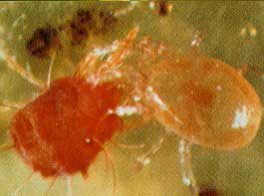Experts from the Entomology Department at Hanoi University of Agriculture have recently completed a breeding process for predatory mites, which can be used in the control of spider mites, aphids, and pests affecting vegetables, legumes, roses, zucchini, oranges, and tomatoes. This method serves as an alternative to chemical pesticides, contributing to increased agricultural productivity, improved quality of agricultural products, and the protection of the ecological environment and human health.
 The predatory mite species available in Vietnam’s natural environment is scientifically named Amblyseius.sp. They thrive best in natural areas with a temperature of around 25 degrees Celsius. In Northern Vietnam, they typically develop from February to November.
The predatory mite species available in Vietnam’s natural environment is scientifically named Amblyseius.sp. They thrive best in natural areas with a temperature of around 25 degrees Celsius. In Northern Vietnam, they typically develop from February to November.
The breeding process for this mite species is quite simple; they are released onto a substrate of bean plants that contain numerous spider mites as prey. Specifically, bean plants must first be sown in a disease-free environment. When the beans have developed six leaves, adult spider mites are released at a ratio of 10 adult mites per plant. Once the number of spider mites increases to about 500 per plant, the predatory mites are introduced (2-3 mites per plant).
After just 7-8 weeks, the population of predatory mites increases to 13 times the initial density; at that point, both the predatory mites and their food source are moved to areas where vegetables need protection. To ensure the rapid growth and development of predatory mites in environments with few spider mites, the researchers also utilized white mites and various food sources such as pollen and honey to sustain the predatory mites.
Associate Professor Dr. Nguyen Thi Kim Oanh, the head of the research team, stated that predatory mites have a short life cycle and high reproductive capacity; therefore, using them for pest control of aphids, and harmful mites in greenhouses and net houses is very suitable and effective. Additionally, this research team has successfully bred predatory bugs to control thrips that harm vegetables, and they are eager to expand this practice, especially in areas dedicated to clean vegetable cultivation.


















































